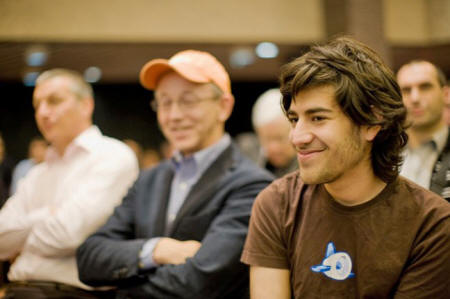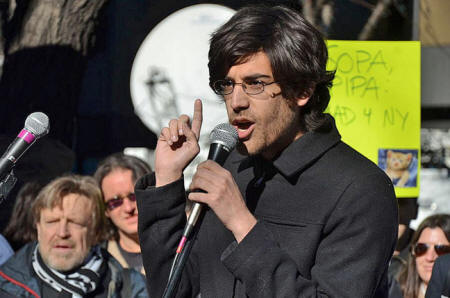|
from
Wired
Website
After half-a-year of delays and roadblocks, the U.S. Secret Service today released the first 104 pages of agency documents about the late coder and activist Aaron Swartz, including a brief report on Swartz’s suicide less than three months before his scheduled trial.
In January 2011, Swartz was caught using MIT’s public network to bulk-download 4 million academic articles from the JSTOR archive.
MIT had a subscription to the archive that made it free to use from MIT’s campus. The Secret Service was brought into the case early on, and federal prosecutors ultimately charged Swartz with wire fraud and computer hacking.
The heavily redacted documents released today confirm earlier reports that the Secret Service was interested in a “Guerilla Open Access Manifesto” that Swartz and others had penned in 2008.
In May 2011, a Secret Service agent and a detective from the Cambridge police department interviewed a friend of Swartz and inquired specifically about the political statement.
The friend noted that Swartz and his coauthors,
The Secret Service documents also describe the February 11, 2011 search on Swartz’s home in Cambridge that came over a month after Swartz was first arrested and released by local police.
The documents were released through my ongoing Freedom of Information Act lawsuit against the Department of Homeland Security, the Secret Service’s parent agency.
I am the plaintiff in the lawsuit In February, the Secret Service denied in full my request for any files it held on Swartz.
When the agency failed to respond to my administrative appeal, I recruited DC-based attorney David Sobel, and we filed suit.
Last month U.S. District Judge Colleen Kollar-Kotelly ordered the government to begin releasing the Swartz files on a rolling basis, but then stayed that order to hear arguments from MIT and JSTOR, who are seeking advance review of any documents released (my lawyer is now talking to their lawyers.)
Last week Kollar-Kotelly directed the government to promptly release the 104 pages that have already been reviewed, and which do not reference MIT or JSTOR employees.
The government says it’s identified 14,500 pages of documents for release on a rolling basis. It estimates it will take six months to process them.
Disclosure I knew Swartz and worked with him on a project.
Aaron Swartz’s Political Manifesto
...Against Him
The prosecution of Aaron Swartz was motivated, in part, by the 2008 “Guerilla Open Access Manifesto” the internet activist had penned advocating for civil disobedience against copyright law, Swartz’s attorney confirmed Friday.
The revelation underscores that the hacking charges against the former director of Demand Progress were bolstered by the 26-year-old’s philosophy of a world unhindered by copyright law, a world in which he said it was a “moral imperative” to unshackle the “privatization of knowledge.”
The Huffington Post first revealed the matter Friday, citing anonymous sources familiar with a closed-door briefing between the Justice Department and members and staff of the House Oversight Committee.
Swartz, who had also written about his own depression, was found dead at his Brooklyn apartment last month after committing suicide.
He was under indictment (.pdf) in Massachusetts for more than a dozen counts of computer hacking and wire fraud in connection to the downloading of millions of academic articles from a subscription database at MIT. An internet sensation who helped develop the Creative Commons and was part of a small team that sold Reddit to Wired parent company Condé Nast, Swartz had apparently planned to release to the public the millions of JSTOR academic papers he downloaded.
His attorney, Elliot Peters, said prosecutors were “very focused” on the manifesto Swartz penned from Italy.
The government, Peters said,
Here is Swartz’s manifesto:
U.S. Attorney Carmen Ortiz, who has come under fire for the Swartz prosecution on accusations she abused computer hacking laws, offered Swartz a six-month plea deal in the weeks before Swartz’s death. Swartz refused the offer.
Prosecutors did not immediately respond for comment.
The prosecution, in part, tested the reach of the Computer Fraud and Abuse Act, which was passed in 1984 to enhance the government’s ability to prosecute hackers who accessed computers to steal information or to disrupt or destroy computer functionality.
The government, however, has interpreted the anti-hacking provisions to include activities such as violating a website’s terms of service or a company’s computer usage policy.
The indictment accused Swartz of repeatedly spoofing the MAC address - an identifier that is usually static - of his computer after MIT blocked his computer based on that number. The grand jury indictment also notes that Swartz didn’t provide a real e-mail address when registering on the network. Swartz also allegedly sneaked an Acer laptop bought just for the downloading into a closet at MIT in order to get a persistent connection to the network.
Swartz hid his face from surveillance cameras by holding his bike helmet up to his face and looking through the ventilation holes when going in to swap out an external drive used to store the documents, according to the indictment.
Swartz is no stranger to the feds being interested in his skills at prodigious downloads.
In 2008, the federal court system decided to try out allowing free public access to its court record search system PACER at 17 libraries across the country. Swartz went to the 7th U.S. Circuit Court of Appeals library in Chicago and installed a small PERL script he had written.
The code cycled sequentially through case numbers, requesting a new document from PACER every three seconds. In this manner, Swartz got nearly 20 million pages of court documents, which his script uploaded to Amazon’s EC2 cloud computing service.
While the documents are in the public record and free to share, PACER normally charges 10 cents per page.
Swartz was not prosecuted for the PACER activities.
|


